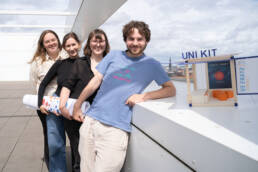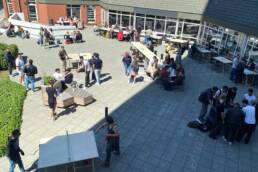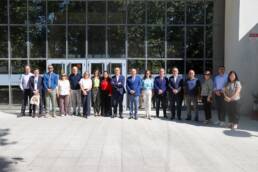STARS EU conference in Groningen NL
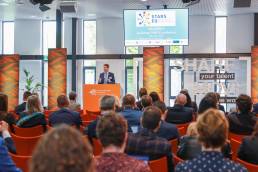
Last Tuesday 31 May and Wednesday 1 June it was time for the Launching STARS EU conference! The conference on 31 May was a great success, bringing together partners from 8 different European countries for the first time. It was great to finally be able to shake hands and look each other in the eye after all these months and years of only seeing each other online and working together intensively. Everyone was cheerful and eager to attend the two-day conference.
Tuesday 31 May, Conference
On the first day, the conference was opened by the president of Hanze University of Applied Sciences, Dick Pouwels. Then the other presidents and rectors of the 7 universities in the Alliance had their turn to address the conference. The 7 other universities that are part of the Alliance are: Polytechnic Institute of Braganca, Portugal, Bremen University of Applied Sciences, Germany, University of La Laguna, Spain, Silesian University in Opava, Czechia, University West, Sweden, Cracow University of Technology, Poland and Atlantic Technological University, Ireland
Of course, the origin of the STARS EU Alliance was explained by project leader Rima Dijkstra, and there was room for an inspiring speech given by Prof. Dr. Jelly Zuidersma. This was followed by all six presentations of the Thematic Interest Groups (TIGs) with the following themes: Digital Transformation, Healthy Ageing, Energy Transition, Circular Economy, Arts & Creative Industries, Entrepreneurship & Innovation. At the end of the first day of the conference, the STARS EU commission meeting took place and there was room for an entertainment programme ‘exploring Groningen’.
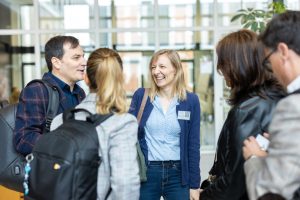
Wednesday 1 June, Parallel meetings
The second day of the conference consisted mainly of parallel meetings in each field. In total, there were 11 different meetings on this day. These ranged from the Steering Committee meeting in the morning to the six TIGs meetings, the Regional Transition Accelerator meeting, expert group meetings, the students meeting and the challenge lab meeting. On this second conference day we have even formed a STARS EU Student Board consisting of students from the 8 partner universities. We believe it is very important that students are involved from the beginning and are heard about the developments for this new future-oriented European university. Below are a few summaries of what was discussed in the different meetings.
The Energy Transition group held its second meeting within the STARS EU alliance. This meeting has had a mixed format, face-to-face and online, due to the fact that previous commitments of several partners did not allow all of them to attend in person. After a brief introduction to the different areas of interest of the partners, it was analyzed the possibility of collaborating through a “Blended Intensive Programme” [1] belonging to the Erasmus call to enhance the mobility of students, staff and faculty, as a starting point for inter-university collaboration. It has been agreed to maintain regular contact, to define the different aspects of this program and to look for common areas where an effective collaboration in terms of research can be carried out.
[1] https://wikis.ec.europa.eu/pages/viewpage.action?pageId=40706342
The Healthy Ageing group brings together multidisciplinary expertise in areas such as nutrition, neuroscience, nursery, physiology, sports science, the built environment and digitalisation from across the STARS EU alliance. The multidisciplinary approach ensures that we are well positioned to discuss and address the societal challenges to healthy ageing.’ The group met today to discuss the priorities for our work together. We had previously set out our short, medium and long term agenda over the next year and at our next meeting we are going to review our undergraduate and postgraduate programme provision. Once these are mapped we will begin discussing the development of a blended intensive programme in healthy ageing. The group also discussed Erasmus Plus opportunities and how we can collaborate on a submission.
The TIG for Entrepreneurship and Innovation met to discuss their plans for collaboration. Options include developing networking sessions for students; best practice sessions for faculty to share tools for innovation; a shared research platform for joint publications between our universities; and developing a BIP (Blended Intensive Programme) to provide short-term international opportunities in our respective university locations. According to Dr Meghann Drury-Grogan, Head of Department of Enterprise and Technology in the School of Business at ATU and member of this TIG “We had an engaging discussion about options for not only developing working sessions for both students and faculty, but how we can interact with the other TIGs. Innovation is a pillar of much of the work across the consortium rather than a stand-alone initiative. It is exciting to represent ATU with our European colleagues and enhance our role in building entrepreneurship capabilities in the West of Ireland!
Arts and Creative Industries meeting started welcoming the new partners into the team, getting everyone acquainted and in touch with the concept, structure and aims of this TIG. We had the opportunity to address three actions that have being developed: a network database, a blended intensive program fostering creativity, directed to staff within the STARS EU Alliance and a mobilising research project towards cultural contextes in dialogue. Acknowledging the need to further discuss these matters, there was an ample consensus regarding the positive connections and outcomes that Arts and Creative Industries can bear into the Alliance, foreseeing a very interesting future ahead of us.
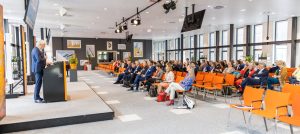 As TIG Digital Transformation we spent time looking back (how the subthemes were organized) and forward (adapting the TIGs for our new partners). Major focus points were: 1) tying our work better to other application domains and other TIGs, 2) more focus on educational technology and challenge-based learning, and 3) how to connect other researchers to our subthemes. Furthermore, we discussed Blended Intensive Programs as a means to get to know each other better.
As TIG Digital Transformation we spent time looking back (how the subthemes were organized) and forward (adapting the TIGs for our new partners). Major focus points were: 1) tying our work better to other application domains and other TIGs, 2) more focus on educational technology and challenge-based learning, and 3) how to connect other researchers to our subthemes. Furthermore, we discussed Blended Intensive Programs as a means to get to know each other better.
At the end of the second conference day, we closed the programme with a boat trip through the canals of Groningen and dinner in Garnwerd aan Zee, a small village just outside Groningen city.
To summarise, these were two very useful and fruitful days, during which we heard from and exchanged a lot of information with each other, and we can now move forward with our plans for the future-oriented European university: STARS EU. Next year in March 2023 the conference will take place at the partner La Laguna on Tenerife, Spain.
Stay up to date with the STARS EU Alliance and follow us on Instagram, Facebook and Twitter!
Were you not able to attend the conference on 31 May? You could watch the conference via the following link: http://www.kaltura.com/tiny/0xrif
Related Posts
July 10, 2025
STARS EU: An intercultural pavilion for a European campus
The Interspace project, developed by students from nine European universities,…
July 7, 2025
“Interspace – O(ut)er Campus” begins with the final project presentation at the Bremen University of Applied Sciences
The project will evolve into a BIP, with its first phase to be developed within…
July 7, 2025
UAMD delegation visits Bragança Polytechnic University to strengthen strategic collaboration
The meeting served to bring together positions in areas as important as…

